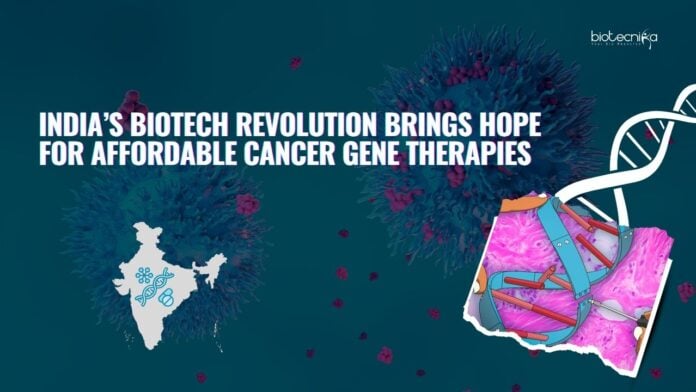India’s Biotech Revolution Brings Hope for Affordable Cancer Treatment
The biotechnology research in India is advancing drastically and marking breakthroughs with homegrown companies and their life-changing outcomes. The companies are making a bold step towards Cell and Gene Therapies for Cancer Treatment, after achieving success in the fields of Biosimilars and Generics. This initiative aims for life-saving therapies that are affordable and readily available to patients.
In cell therapies, a patient’s own cells are taken, reprogrammed and introduced back to the patient. While in gene therapies, the cells are genetically altered either by the addition, modification or deletion of a gene to correct the defects and tackle the disease. For some blood cancers like lymphoma and other genetic conditions, namely sickle cell anaemia, haemophilia, etc., these therapies have been given the green signal.
Over the past year, the indigenous companies have marked the approval of the first CAR-T cell therapies, which reprogram the immune system in case of cancer by detecting and destroying abnormal cells. NexCAR19, a CAR-T cell therapy, is the first of its kind was developed by Mumbai-based ImmunoACT in collab with IIT Bombay and Laurus Labs. These Indian versions came in ₹30–50 lakh, while the similar treatment in the US costs about ₹3 crore (US $400,000). Bengaluru-based Immuneel Therapeutics has also taken India one step higher with its research on this particular area.
The Growing Chain
Bharat Biotech: Following the remarkable recognition in the development of India’s first native vaccine, Covaxin, Bharat Biotech has now entered into Cell and Gene therapies. Its recent launch, Nucelion Therapeutics, is wholly dedicated to Next Generation cell and gene Therapy Contract research, Development, and Manufacturing (CRDMO).
Other notable organizations like Syngene, Laurus Labs, and Aragen are also the key players in the evolution of therapeutics in India. Manufacturing and testing therapies locally can cut down the dependency on imports and delays of regulatory approvals, according to the native patients’ profiles.
However, the road ahead isn’t straight. High production costs, specialised infrastructure, and regulatory approvals are the major drawbacks. No doubt this will strengthen the country’s goal to become a global leader in affordable Biotech innovation. This doesn’t stop here; this development also adds potential benefits across various domains, including academic research, clinical trials, and healthcare training.
India’s Cell and Gene therapy is still in its infancy, but it aims to build an indigenous and affordable cancer treatment. For numerous patients fighting cancer, these developments can be a ray of hope.


























